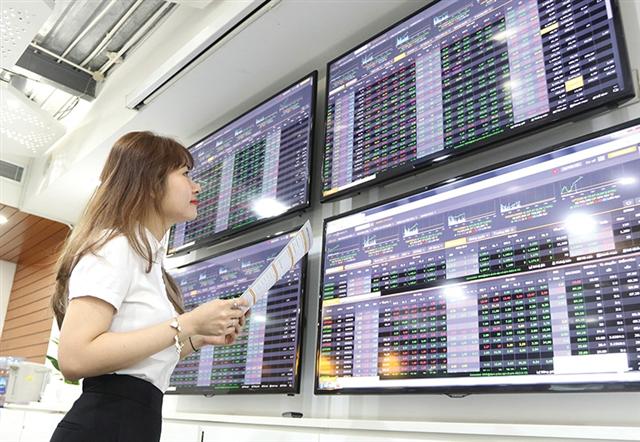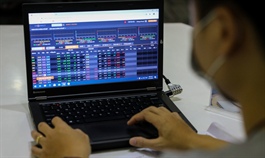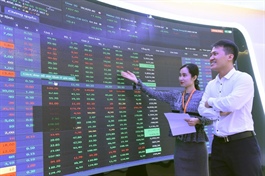Expectations prop up stock prices
Expectations prop up stock prices
Despite broad-based sell-offs eroding the market in the first half of 2020, optimism about potential vaccines and low interest rates have pushed the domestic stock market to record heights. Bach An Vien and Bui Ngoc Chau, analysts at Mirae Asset Securities, write about the appeal of Vietnam’s equity market and the forecast for 2021.

The new US administration, and its subsequent decisions regarding US-China trade, will have a big effect on global stock markets
|
The current price-to-earnings (P/E) ratio of the VN-Index by the end of 2020 was 17.6x, 10 per cent higher than the 5-year average of 16.0x. Valuations are no longer low, but still much lower than the 22x in early-2018, when the VN-Index reached its historical high of 1,200 points.
Vietnam’s stocks are still priced low compared to other Asian countries and are buoyed by economic growth prospects, corporate profits, and return on equity in 2021, which are forecast to outperform other markets. Furthermore, stock market valuations continue to be attractive for long-term investors, especially foreigners.
According to Bloomberg’s Consensus Economics, P/E is forecast at around 14.0x for 2021, much lower than the historical peak of 35x. This means that valuations are still low and opportunities remain open for medium- to long-term investors.
We project the target P/E ratio to move within the 17-20x interval. Markets will be less volatile on the assumption that no unexpected events occur. Meanwhile, investors are willing to pay a higher price, based on the prospects of economic and corporate profit recovery.
These expected P/E valuation intervals make us believe that there is no risk of an asset bubble occurring in 2021, even though the market has been consistently exceeding expectations for a while.
As of last June, the net profit growth of listed companies on the Ho Chi Minh City Stock Exchange (HSX) declined around 15.5 per cent on-year after sales fell by 11.8 per cent on-year.
The decline in domestic and export demand was accompanied by a sharp decline in the ageing of inventory and slump in the tourism sector due to the impact of the pandemic. Overall profit growth was negatively affected by sectors such as utilities, energy, transportation, and real estate.
By contrast, banks became the bright spot in last year’s first half profit picture, thanks to sustained credit growth and improved risk management.
Projections for the year
In our assumption, 2021 earnings are forecast to rebound strongly, up 19 per cent due to a low base in 2020, as economic activity returns to normal and a more pronounced shift in outside demand occurs.
Corporate profits will recover in many industries, after establishing a low base in 2020. Of these, real estate, construction, and logistics play a leading role, while banking maintains its momentum of cumulative profit growth.
The business results of enterprises in export and retail have seen positive developments in external and domestic demand. Similarly, the energy sector also marked strong growth, thanks to the solid recovery of basic commodity prices. Relatively stable input prices, along with deep reductions in capital costs, contributed to improved profit margins. The index uptrend is expected to continue in 2021, with the upper target for the VN-Index being 1,355–1,425 points, an increase of 30 per cent on-year.
Corporate income growth is estimated at 19 per cent on-year, with the upper target P/E of 19-20x, assuming the economic recovery continues. The VN-Index will have the opportunity to rewrite history, after surpassing the 1,200-point peak set in 2018 to establish a new high.
However, the level of market volatility is expected to increase after the VN-Index sets new highs. After a large-scale rally, following the market recovery in last April, the differentiation between sectors and stocks has become clear, and investors will have time to review the post-pandemic business results of enterprises, especially in the second half of 2021.
On the other hand, the VN-Index may not reach the aforementioned expectations if the pandemic recurs in Vietnam. Even if it does, it is unlikely that the VN-Index will fall below the 1,100-point mark reached by the end of 2020.
Bull market impetus
Our theory could prove right as the pandemic is effectively controlled domestically, along with the development of effective vaccines, promoting a V-shaped recovery.
Moreover, easing monetary policies will be maintained and cash flows from new investors will keep market liquidity at a record high level, helping stock prices rebound.
Easing public investment policies, together with an ongoing wave of global supply chain restructuring, will play an important role in investment and consumption.
Vietnam’s stock market is increasingly looking like a potential candidate for an emerging market status in the near future, along with increased net-buying from foreign investors.
The government has signalled its eagerness to accelerate state divestment, which will pave the way for the stock market to thrive.
Individual investors, including new ones, are becoming the main growth engine of the market. In 2020, the net buying value from domestic individuals amounted to VND17.72 trillion ($770 million), absorbing the net selling amount of around VND18.52 trillion ($805 million) by foreign investors. Individual investors opened 392,000 new securities accounts last year, more than double that of 2019. Last December recorded more than 63,000 newly-opened personal accounts, up 53 per cent on-month.
The gap between money supply growth and credit growth remained high, at 2.5 per cent, meaning that free liquidity continues to increase alongside the downward trend of deposit rates. Accordingly, the stock market is expected to benefit greatly from the abundant liquidity of the banking system.
Cash flow participating in the stock market will also establish a new high, thanks to the attractiveness of the securities channel, which is outperforming other alternative investment channels, such as gold, foreign currency, deposits, and real estate.
Vietnam’s stock market is working to improve its criteria to meet the market upgrade requirements of MSCI and FTSE. On the flip side, the ownership limit for foreign investors is still the biggest impediment. The government is moving to speed up intraday transactions, as well as loosen regulations on state ownership in 2021.
Vietnam could be a potential candidate for an emerging market upgrade by 2021, or as late as 2022. If entering the MSCI EM Index, the proportion of Vietnam’s stock portfolio is expected to be at 0.4-0.6 per cent, equivalent to a disbursement rate of $100-149 million. If entering the FTSE EM Index, Vietnam stocks will have a disbursement rate of $250-450 million.
In December, the MSCI Frontier Markets 100 Index planned to disburse approximately $60 million for the first phase and will now disburse four more times with a total value of about VND5.52 trillion ($240 million) until the end of 2021, after MSCI raised the proportion of Vietnamese shares to 28.8 per cent from 15.8 per cent in the frontier market portfolio.
The pandemic is not expected to disappear within this year, and global economic growth will take more time to return to pre-pandemic levels. This will have a significant impact on Vietnam’s economic growth in the medium term, as the country is becoming more deeply embedded in the global supply chain.
Global stock markets will continue to be affected by geopolitical events, such as the US-China tensions after Joe Biden’s election, along with unpredictable policies.
The pressure on stock valuation has increased globally after a period of rapid and strong recovery. Many key indexes in the world have established historic highs, and it is natural that the market may experience corrections after setting historic peaks.
Macro risks will increase in the medium and long term, due to excessive monetary and fiscal policy easing, which need special monitoring, including inflation, exchange rates, and public debt.
Stock supply pressure has skyrocketed from new listings and capital raising in a booming environment, with share prices setting record highs. In the first two weeks of 2021, the HSX has approved the listing of 10 businesses, equal to one-third of newly-listed companies in 2020.




























